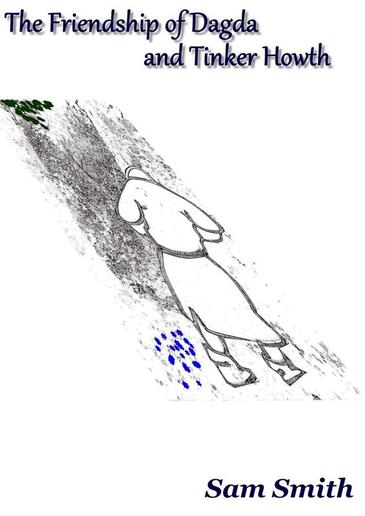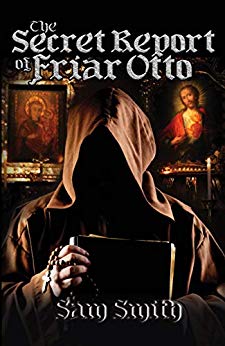
The Friendship of Dagdá & Tinker Howth
This peculiar historical tale has its own history, languished in different publishers' pending trays for years, prior to those publishers also becoming historical footnotes. At last however 'The Friendship of Dagdá & Tinker Howth' is able, as paperback and e-book, able to poke its head out from the undergrowth in the hope of getting itself noticed.
One time called Kitnor, now Culbone, three miles west of Porlock is a steep combe further concealed by close-grown sessile oaks. Isolated, and on the Devon/Somerset border it has been variously used over the centuries as a place of refuge and of banishment. Latterly it has become a destination for poetaster pilgrims - Kubla Khan having been written in the vicinity. Could 'The Friendship of Dagdá & Tinker Howth' however be the true origin of Culbone's pretty little church? Or could Tinker Howth's tale, set in the first Elizabeth's reign and in the one-time leper colony, be the underlying reason why the word 'Porlock' is held in such low esteem by literati? And nothing whatsoever to do with Coleridge's creatus interruptus ..?
eBook available here - https://www.smashwords.com/books/view/1140319
Paperback £12.00 + £3.00 postage (UK only)
This peculiar historical tale has its own history, languished in different publishers' pending trays for years, prior to those publishers also becoming historical footnotes. At last however 'The Friendship of Dagdá & Tinker Howth' is able, as paperback and e-book, able to poke its head out from the undergrowth in the hope of getting itself noticed.
One time called Kitnor, now Culbone, three miles west of Porlock is a steep combe further concealed by close-grown sessile oaks. Isolated, and on the Devon/Somerset border it has been variously used over the centuries as a place of refuge and of banishment. Latterly it has become a destination for poetaster pilgrims - Kubla Khan having been written in the vicinity. Could 'The Friendship of Dagdá & Tinker Howth' however be the true origin of Culbone's pretty little church? Or could Tinker Howth's tale, set in the first Elizabeth's reign and in the one-time leper colony, be the underlying reason why the word 'Porlock' is held in such low esteem by literati? And nothing whatsoever to do with Coleridge's creatus interruptus ..?
eBook available here - https://www.smashwords.com/books/view/1140319
Paperback £12.00 + £3.00 postage (UK only)

The Secret Report of Friar Otto being a 21st century reinterpretation of The Report In Confidence On The Imprisonment & Execution Of William de Marisco & 16 Of His Followers
'....The story is a brilliant reinterpretation of a 750 year old manuscript which spins a web of deceit and political intrigue all the while making the reader wonder if the knights were guilty of their crimes or set up to take the fall for higher powers. / This is a unique book, full of history as well as a very unusual mystery which will draw the reader into life as it was centuries ago. A life that is filled with as much `behind the scenes' political drama as we have in today's modern world. A fun and informative read.' D. Alan Lewis
'I found myself pulled into the narrative as Otto interviews de Marisco and his men, trying to learn more about what drove them to apparent revolt and crime, whilst wondering whether they are actually guilty of what they have been accused and whether everyone is who they appear to be. An unusual mystery that takes the reader away from the well-worn paths of medieval history and fiction. Highly recommended.' DJ Tyrer The Supplement: Atlantean Publishing
'...a beautifully written modern novel, utterly convincing in its evocation of the medieval world and mindset...' pulp.net
".... a great history lesson focusing on the politics of the time... the kings, the court and the church, who uses whom and what devices they used to wield that power. It was a dangerous time for people with dangerous ideas. And, it seems, the more things change, the more they stay the same. / Friar Otto is a brave and likable man with strong character and an open mind." Merle Jones
For another review by Bob Corbett see - http://www2.webster.edu/~corbetre/personal/reading/smith-otto.html
Paperback £8.99 + £3.00 postage (UK only)
'....The story is a brilliant reinterpretation of a 750 year old manuscript which spins a web of deceit and political intrigue all the while making the reader wonder if the knights were guilty of their crimes or set up to take the fall for higher powers. / This is a unique book, full of history as well as a very unusual mystery which will draw the reader into life as it was centuries ago. A life that is filled with as much `behind the scenes' political drama as we have in today's modern world. A fun and informative read.' D. Alan Lewis
'I found myself pulled into the narrative as Otto interviews de Marisco and his men, trying to learn more about what drove them to apparent revolt and crime, whilst wondering whether they are actually guilty of what they have been accused and whether everyone is who they appear to be. An unusual mystery that takes the reader away from the well-worn paths of medieval history and fiction. Highly recommended.' DJ Tyrer The Supplement: Atlantean Publishing
'...a beautifully written modern novel, utterly convincing in its evocation of the medieval world and mindset...' pulp.net
".... a great history lesson focusing on the politics of the time... the kings, the court and the church, who uses whom and what devices they used to wield that power. It was a dangerous time for people with dangerous ideas. And, it seems, the more things change, the more they stay the same. / Friar Otto is a brave and likable man with strong character and an open mind." Merle Jones
For another review by Bob Corbett see - http://www2.webster.edu/~corbetre/personal/reading/smith-otto.html
Paperback £8.99 + £3.00 postage (UK only)
